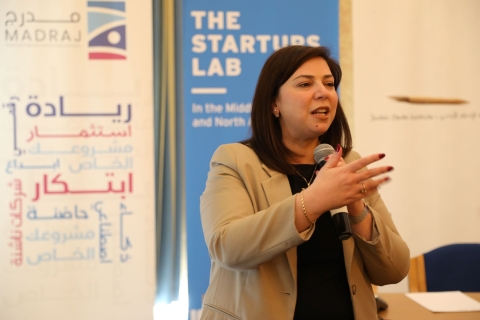Rawan Jayousi is an ICFJ Knight Fellow. This article was first published on IJNet.
I'm a woman journalist from the Middle East who has witnessed the critical need for independent media in the region. To this end, I believe the startup culture prevalent in the tech world can be replicated in journalism: it can spur the creation of new digital media enterprises and platforms for underrepresented voices, giving the news ecosystem a much-needed boost.
In 2022, I left my job and, with the support of an ICFJ Knight Fellowship, launched an incubator to help establish women and youth-led media startups. Called the Media and Digital Runway for Arab Journalists (MADRAJ), we select promising startups for six-months of intensive work with media sustainability experts and mentors, who help them develop business strategies. We aim to create a community of independent outlets that will enrich journalism in the region.
Here are my top five recommendations for fellow media entrepreneurs launching startups of their own, drawing from lessons learned during my time with MADRAJ and from working with our innovators.
(1) Close the deal before you leave the room
For one of my first projects, I had my elevator pitch ready for a meeting with a potential funder. This funder loved the idea, and told me to follow up with his team. However, they had too much on their plate and didn’t follow through with me in time. I had to postpone the project until the next funding cycle.
Today, I always have a proposal ready to be signed on my phone, and I try to close the deal before the funder leaves the room.
(2) Don’t make promises when you’re excited
This is the flip side. Sometimes you may be in a strong position, with extra funds, and you feel like saying yes to everything you’re excited about. But there are always critical details you should investigate before you commit to anything, like finding out about legal and financial requirements, or government restrictions that may be obstacles for your project.
Be cautious with your promises. Start with a shared proposal document for your team to contribute to, investigate the viability of the idea, and review the potential risks. The time to get excited is when you sign the contract.

(3) Always have a plan B and C (and D)
Map your network so you know who to turn to if and when something goes wrong.
In a recent major project we led at MADRAJ, we thought we had everything organized and ready to go a few weeks before the launch. But one by one, key players began to drop – there was a family illness, a premature birth, a health crisis. We dipped into our network and filled these spots quickly with great performers.
No matter who you work with, make sure they are appreciated and feel part of the mission. The people who filled in last-minute worked extra hard because they appreciated the key part they were playing in our effort. Today, these fill-in team members have important roles with MADRAJ, and our network is stronger as a result.
(4) Be patient with yourself
In journalism, you might report a story and find it doesn’t change the world as you had hoped. You did what you could to inform people and uncover wrongdoing – you just didn’t have the magic ingredient to make change happen.
As an entrepreneur, it can be even harder. You may have a great idea but it might not be viable or interest investors, not to mention the timing simply may not be right with the market. Don’t be discouraged. This is experience you can apply in your next project.
Remember, it’s fine to ask for help. Take care of yourself. Learn from your mistakes – that’s life. If you’re not making mistakes, you’re not pushing yourself.
(5) Know when you have to stop
Founders are passionate people who work hard to make their ideas reality. This can take a lot of energy and resilience. But they need to know when to stop pestering the same donor, or investing in an employee who isn’t growing in their role, or pushing a startup that doesn’t seem to be taking off.
Decide where your cutoff points are. Think about how you will know when an experiment isn’t working. Introduce limits and boundaries, and then institutionalize them. Ending something can be more difficult than pushing forward – but it can free you up to take on other, more promising projects.